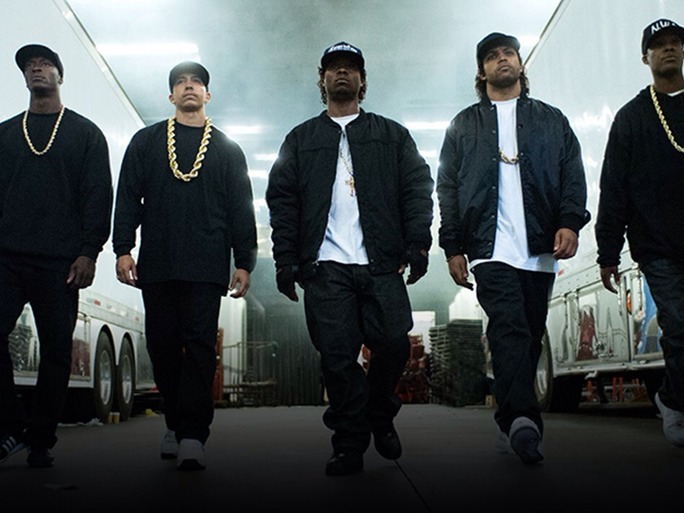 I screened F. Gary Grey's Straight Outta Compton twice before it hit theaters. Both times, I was enraptured in the film. (You can read my review on Shadow and Act) N.W.A. was born out of Compton, California at a time when the community was reeling from the drug epidemic and unimaginable impoverishment. The group and their hit songs not only helped birth hip-hop as we know it, but would also introduce the world to some of the most revered rap artists of our time, including Eminem and Snoop Dogg. From what I knew about the group prior to seeing Compton as well as the film's portrayal, it was a long and very difficult road for N.W.A. to get where they are now. Though Grey was careful not to gloss over many aspects of the groups rise and subsequent disbandment, as I dug more into the history of the group, I learned there were still many voices silenced in the film.
I screened F. Gary Grey's Straight Outta Compton twice before it hit theaters. Both times, I was enraptured in the film. (You can read my review on Shadow and Act) N.W.A. was born out of Compton, California at a time when the community was reeling from the drug epidemic and unimaginable impoverishment. The group and their hit songs not only helped birth hip-hop as we know it, but would also introduce the world to some of the most revered rap artists of our time, including Eminem and Snoop Dogg. From what I knew about the group prior to seeing Compton as well as the film's portrayal, it was a long and very difficult road for N.W.A. to get where they are now. Though Grey was careful not to gloss over many aspects of the groups rise and subsequent disbandment, as I dug more into the history of the group, I learned there were still many voices silenced in the film.
In 1991, Dr. Dre, viciously attacked and beat a young journalist by the name of Dee Barnes in a nightclub. It seems that he was displeased with N.W.A. depiction in an interview Barnes did with Ice Cube. Barnes' lawsuit against Dr. Dre for the crime was eventually settled out of court in 1993. This horrific event was not depicted at all in Straight Outta Compton, despite the fact that the film chronicles the group from 1986 to group member Eric "Easy- E" Wright's death in 1995. Likewise, Dr. Dre's tumultuous and often violent relationship with artist Michel’le was never acknowledged. Furthermore, the film erases the major contributions of female hip-hop artists including Ice Cube's female protegee Yo-Yo; nor the many horrific and mysoginist lyrics from tracks like "A Bitch Iz a Bitch" and "She Swallowed It". Film director Grey has been reluctant to address any of these topics, telling the Associated Press that the original cut of the film which included the group members relationships with women came in at three and half hours, and the film had to be cut down.
As I said previously, the film is exquisite not just in the perfect way it captures Compton in the late 1980's and 90's and the casts stunning portrayals, but also for the stark parallels that it draws between the Rodney King trials and LA Riots as well as the #BlackLivesMatter movement and issues with police brutality that we are still dealing with presently. And yet, all of these things do not erase the many issues the group had with women. They may have been omitted in the film, but they can certainly not be erased or ignored because they did happen.
Film director Ava DuVernay who was born and raised in Compton during this time period, penned an eloquent twitter essay about Straight Outta Compton acknowledging the beauty of the film, but also the harsh realities for women and hip-hop culture.
It seems obvious why Dr. Dre and Ice Cube who were directly involved in the project, didn't want their dirty laundry aired on screen. As Dee Barnes said in her Gawker essay about the film and her experience, "The truth is too ugly for a general audience." As a woman who is black and who is deeply in love with hip-hop, I find myself once again in a very peculiar space. trying to understand the Intersectionalities that continue to pull me in various directions. Hip-hop is and will continue to be been problematic for women, and we must continue to speak about that and voice our opinions. As women, we must continue to tell the stories that no one wants us to tell, even if they are ugly and brutal and not easily digested by a larger audience. I would still urge everyone to see Straight Outta Compton. The film is truly is a stunning work and it speaks deeply to our time, but it's certainly not the whole truth.
Watch the trailer below.
[embed]https://www.youtube.com/watch?v=OrlLcb7zYmw&oref=https%3A%2F%2Fwww.youtube.com%2Fwatch%3Fv%3DOrlLcb7zYmw&has_verified=1[/embed]
Images: Universal Pictures/Jaimie Trueblood (2)



